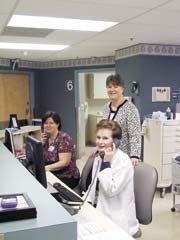Care Doesn’t End After You Leave the ER
Er follow-up phone calls are all in a day’s work at Claremore Regional Hospital as part of their commitment to great patient care
By: Cheryl West | Category: Health & Fitness | Issue: February 2011

ER follow-up phone calls being made by ER Manager Tammy Lawson, BSN, and Patient Advocate Amanda Renne, LPN, with Chief Nursing Officer Dava Baldridge, RN, MBA, checking in on their progress.
After a visit to the emergency room, it’s not uncommon for family and friends to check in to see how you’re doing, stop by with a casserole, or help with errands until you’re back on your feet. However, you may not expect to hear from the ER staff that treated you. But patients who have visited Claremore Regional Hospital’s ER recently shouldn’t be surprised when they receive that phone call.
ER follow-up phone calls are all in a day’s work at CRH as part of their commitment to great patient care – and that care doesn’t end when a patient is discharged home. This approach is known as the Discharge Callback Administrator (DCA) program.
Patients receiving treatment at Claremore Regional’s ER will be asked by a member of the ER staff for permission to call after the patient is discharged home. Patients who agree to a follow-up call are contacted within four days by a member of the medical or administrative staff – usually an experienced nurse or another member of the clinical team.
The hospital representative will ask the former ER patient how he or she is feeling, if they understood their discharge instructions, physical condition or changes, and if they got their medications filled. The representative will also inquire about the patient’s experience at Claremore Regional and how satisfied he or she was with the care and service.
“Our goal is to contact 100 percent of the patients who come to our ER for treatment – and we’re proud to report that currently, we’re making contact with 80 percent of our discharged patients,” explains Chief Nursing Officer Dava Baldridge. In 2010, 4,508 discharge calls were performed by Claremore Regional medical or administrative staff to patients in the community. “This call is a patient’s opportunity to ask any questions about their medical care or recovery, and our chance to collect valuable feedback about the service we provide.”
Patients are encouraged to be honest about their experiences. “The DCA program is intended not only to promote patient satisfaction, but also to give our hospital staff feedback on how well we are meeting – and hopefully exceeding – our patients’ expectations,” says Baldridge. “The patient’s feedback will help us to recognize individual staff members for outstanding service, to learn more about the patient experience at our hospital, and to identify opportunities for improvement.”
Patients who have a concern about medication, diagnosis questions or matters that need urgent attention are tagged for another follow-up call from a medical staff member.
“We take these calls seriously and want to hear what the patient’s experience was like so that we can recognize those staff who excel at patient care and reinforce good habits, as well as identify areas where we could do a better job,” says Baldridge. “All responses are valuable to us, as they help us identify our strengths and opportunities to improve.”
The DCA program is intended to build good relationships between the hospital and the patients served. Its goal is to reinforce the service that the patient received in person. In addition to enhancing patient satisfaction, the program has been shown to contribute to better clinical outcomes for patients.
Learn more at www.claremorereghospital.com, or call (918) 341-2556.
For more information, contact
Claremore Regional Hospital
Claremore Regional Hospital
For more information, contact:
Claremore Regional Hospital
Claremore Regional Hospital Online:
More about Claremore Regional Hospital:
More ArticlesSubscribe
For Free!



